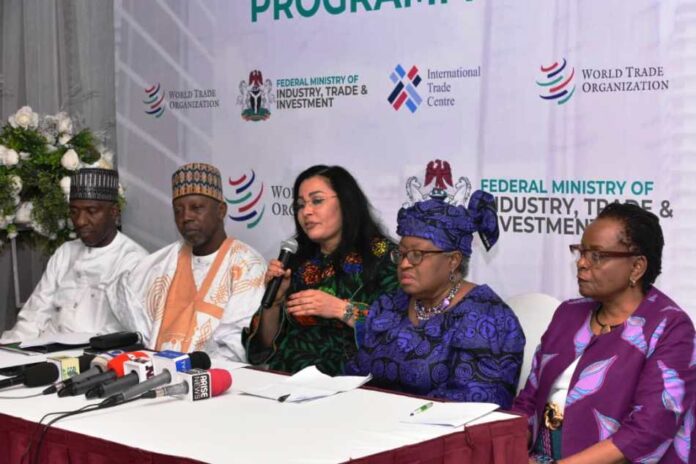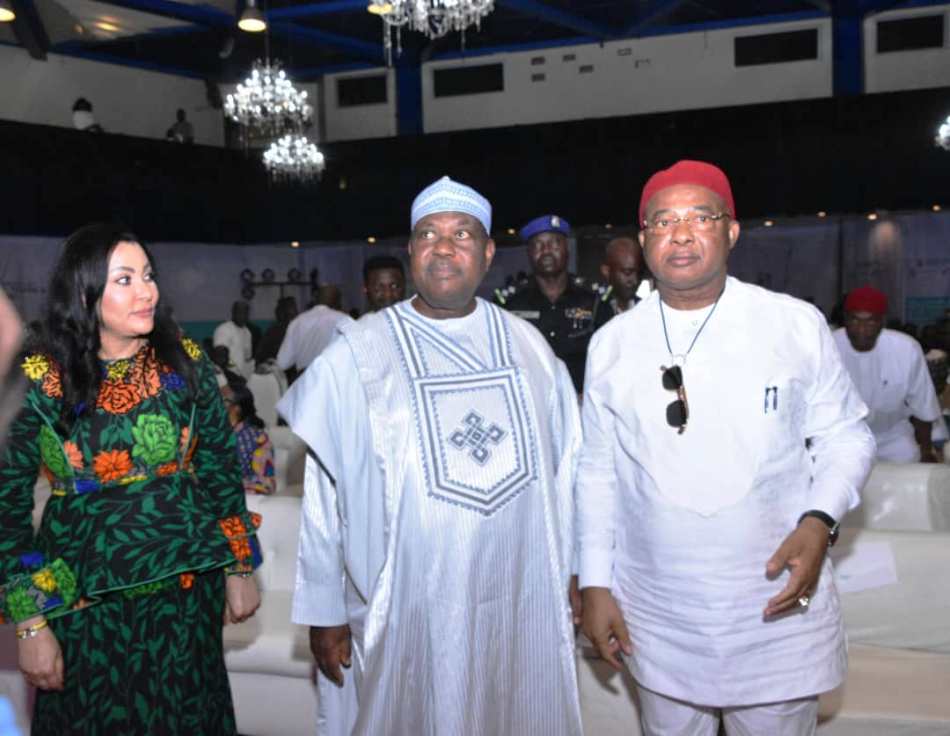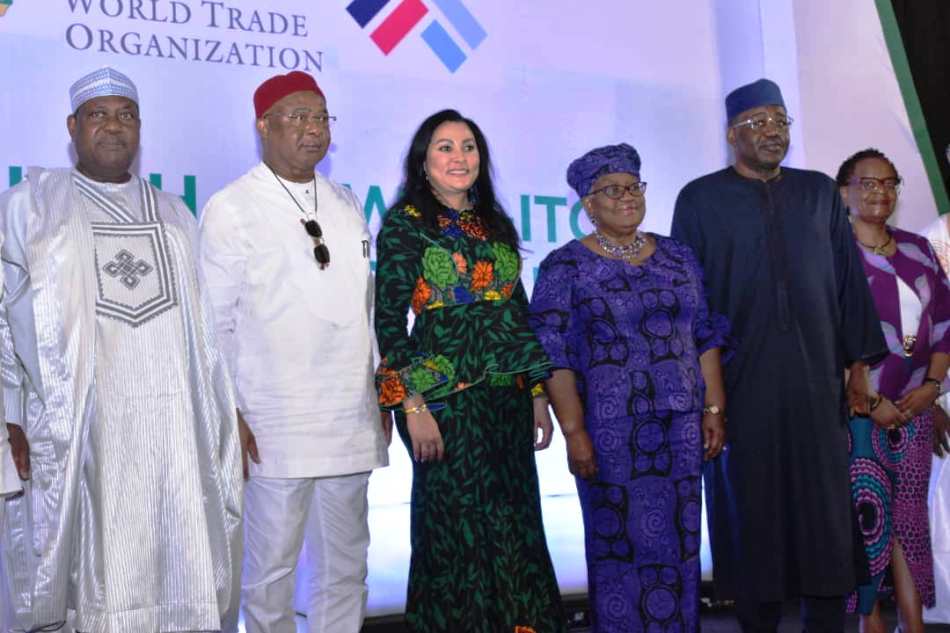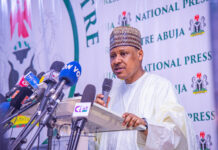
Excellency Mr Vice President Kashim Shettima ably represented by Deputy Chief of Staff to Mr President,Excellency Mr SGF Senator George Akume, Excellency Governor of Imo State – I miss my own Governors of Abia State and Delta State, Hon Members, H.E Minister of Trade and Industry – Dr Doris Uzoka-Anita and Ministers of Finance, Budget and other Ministers here present, Former Minister of Trade and Industry Otunba Adebayo, members of the diplomatic corps especially our very own Ambassador to the WTO. H.E Dr Adamu Abdulhamid, Ladies and Gentlemen, all protocols observed.
- It’s always wonderful to be back home in Nigeria. But I must confess that whilst I am happy, I am also sad. I am sad because I am here at a time when once more hundreds of our school children and teachers have been abducted, as a mother, grandmother, educator and someone for whom education is paramount for creating opportunity, I am very sad and I do hope we can recover those missing very soon. The occasion that brings us here today I hope will be one that helps our quest to bring benefits directly to people by supporting the Ministry of Trade, Industry and Investment, the Federal Government and the States to pursue Nigeria’s objectives of diversifying the economy.Today I shall talk about the ways the WTO and our affiliated agencies like the International Trade Centre and the Standards and Trade Development Facility aim to support the diversification objectives here in Nigeria.
- For organising this today, I want to thank H.E. Dr. Doris Nkiruka Uzoka-Anite, Minister of Industry, Trade & Investment (MITI), NEPC Executive Director Nonye Ayeni, Permanent Secretary MITI – Ambassador Nura Abba Rimi, ITC Deputy Executive Director Dorothy Tembo and her team, the STDF team behind the sesame and cowpeas value chain project being launched this week, and Nigeria’s very persuasive and hardworking Ambassador to the WTO, H.E. Dr. Adamu Mohammed Abdulhamid. And I want to thank all of you for taking time out of your busy schedule to be here.
- I always say that an underappreciated fact about the WTO is that it is about people. It’s set out in the preamble to our founding Marrakesh Agreements, which states that the purpose of the WTO is to use trade to raise living standards, create jobs, and promote sustainable development. These goals are fundamentally about people’s lives and living standards.
- That said, the rules governing global trade negotiated among our now 166 – members can sometimes seem distant from day-to-day life and business operations.
- But in reality, they are not. They actually underpin daily lives. The goods people consume and those they export are being traded on the basis of WTO rules that keep international trade open, predictable, stable and fair. Our trade facilitation agreement, where implemented, helps customs cut costs of goods coming in and out of countries making things easier for importers and exporters. Our Sanitary and Phytosanitary Measures (SPS) and Technical Barriers to Trade (TBT) Agreements ensure traded goods meet certain quality standards globally and our recent Fisheries Subsidies Agreement once it comes into force will help prevent illegal fishing of our waters. I want to congratulate Nigeria for being one of the first countries to ratify the Fisheries Subsidies Agreement.
- But one stream of the WTO’s activities is easier to relate to because it is about working directly on the ground in developing countries to equip and empower businesses – typically micro, small, and medium-sized enterprises, often run by women or young people – to seize international market opportunities.
- Probably my favourite example of this work comes from here in Nigeria. Soon after taking office at the WTO three years ago, I had an opportunity to meet a group of women from a Shea butter cooperative in Oyo state. They had worked with the NEPC, the Federal Ministry of Industry, Trade and Investment, the International Trade Centre, and the STDF to meet international safety and quality standards. Obtaining international safety certification opened the door to exports to the US, the UK, Europe, the Middle East, and South Africa, as well as sales to more lucrative market niches within Nigeria. But the best part of the story was what the women told me about their own lives. Their incomes had risen sharply actually tripled – and had stayed higher, well after the end of the project.They had been able to pay for higher education for their children, and to invest in side businesses. In short, they were thriving. This was trade working for people – and working for a more inclusive, more diversified Nigerian economy.
- That experience is why I am so excited about one of the key projects we are launching today with STDF, ITC, and the NEPC, a project to help with international safety and quality certification for sesame and cowpeas or black-eyed peas.
- The agriculture sector in Nigeria has the potential to be a major driver of export diversification and job creation – but too much of this potential remains unrealized, due to a variety of barriers. We all know the story about Nigeria being a significant exporter of palm kernel, groundnuts, palm oil, cotton and cocoain the past– but again we all know, the country has since become a net importer of many of those goods. In fact, Nigeria has not only lost out in agricultural export markets, it is a net food importer spending about billions a year for goods, many of which we can also produce here.
- A World Bank paper put it, and I quote “Nigeria… used to be a formidable agricultural exporter. Up to the mid-1960s, the country’s share of world agricultural exports was more than 1 percent… However, agricultural exports collapsed as the economy shifted towards petroleum exploitation, and by the mid-1980s Nigeria’s world market share for agricultural products had dwindled to less than 0.1 percent.”
- Some of Nigeria’s unrealized potential has to do with trade-related problems on the supply side – and that is what this project is seeking to rectify.
- Nigeria is the world’s largest producer and consumer of cowpeas. Sesame is primarily an export crop, and Nigeria is the world’s fourth leading producer, exporting to the EU, Türkiye, Japan, South Korea and other Asian markets. However, Nigerian cowpea and sesame exports have increasingly faced rejections in several destination markets due to non-compliance with international SPS requirements.
- For example, Nigeria accounts for over a third of Japan’s sesame imports –but health and safety inspections during the past few years have found instances where pesticide residue levels were nearly double the maximum residue limits permissible from 2019 to 2021.
- To tackle these problems this new project aims to build the capacities of stakeholders across the sesame and cowpeas value chains to better understand market access requirements, to improve agricultural practices such as pesticide application, hygiene techniques, harvest and post-harvest methods, and food safety. The project – which will kick off with an initial amount of $1.2 million – of which nearly a million comes from STDF – will also be used to train local food safety advisers. This type of project is one I term a low expenditure, high impact project. The WTO is not a financing agency like the World Bank or IMF but it has a wonderful secret that I find very attractive. It spends small sums of money to make big impact. You cannot imagine how a million-dollar intervention can earn Nigeria hundreds of millions of dollars if not billions (you heard ED NEPC talk of several billions) in increased agricultural exports, supporting improved incomes for farmers, exporters, businesses and others once agriculture producers and exporters follow the correct sanitary and phytosanitary standards.
- However, to succeed fully, we also need partnership. One of the big gaps in the sesame and cowpeas value chains is the lack of quality post-harvest storage and transport infrastructure – that is, things like modified atmosphere and airtight storage, or the use of triple-layered bags). Some producers may be applying pesticides during storage and transport to compensate for storage and transport conditions that are conducive to pests. The STDF project on its own cannot solve all these issues – we would like to partner with other organizations or with states, to improve the storage and transport infrastructure. If we can make this sesame and cow peas standards upgrade a success story like we did with the Oyo Shea Butter then we shall be able to look at other export crops and scale up. The goal is to get Nigeria back as an important quality agriculture exporter.
- But this agriculture quality upgrade project is not all we have for you today. There are other interventions we hope to make happen soon.
- Nigeria is one of the pilot countries for the WTO-World Bank Digital Trade Initiative for Africa, which seeks to improve digital connectivity of the Nigerian economy and regulatory capacity.
- Based on an assessment of where Nigeria stands with its digital hardware and software infrastructure, the World Bank in partnership with the WTO is prepared to assist to develop or upgrade digital (soft and hardware) infrastructure. The WTO will help build the necessary regulatory framework and capacity. Nigeria is one of nine pilot African countries to which the World Bank has allocated about $1 billion for the pilot project. I know the World Bank is already doing some work in this area, including trying to crowd in private investments and where possible working with the Ministry of Communication, Innovation and Digital Economy. We hope this pilot Africa Project can help enhance this effort in Nigeria to support digital trade.The future of trade is digital and digital trade is the fastest growing segment of trade at this time, especially digitally delivered services trade. The future of technology is Artificial intelligence and Nigeria, and indeed Africa must be equipped to benefit from digital tech and AI.
- Now just two weeks ago at the WTOs Ministerial Conference, the WTO and ITC launched The Women Exporters in the Digital Economy (WEIDE) Fund. This $50 million fund is meant to support women entrepreneurs who are trading digitally to scale up their businesses and access global value chains. The fund will open for applications soon and working with Honorable Minister Dr Uzoka Anite and Ambassador Adamu we hope a proposal can be put up so that Nigerian women can benefit from this.
- Finally, at a more technical level, in the next few months alone, Abuja will host one WTO workshop for stakeholders on intellectual property and international best practices, and another to train customs and border security agencies on clearing goods promptly in line with the WTO Trade Facilitation Agreement.
- Down the line, I am hoping that Nigeria can also benefit from another program we are doing with the Cotton 4 countries – Benin, Burkina Faso, Chad, Mali and Cote D’Ivoire. This is a partnership with FIFA, UNIDO, ITC, AFREXIMBANK, ICAC and Better Cotton, which aims to help the C4 add value to their cotton production and take advantage of the $270 billion global sports apparel market. We anticipate benefits for Nigeria as increased production will require deeper regional supply chains and the diversification of production nodes.
- Finally, let me also mention and commend both the ITC and the Ministry for the new trade intelligence service that is being developed. This will include both a Trade Intelligence Unit – that will provide information services to the business community and the government, as well as a Trade Intelligence Portal that will provide information on trade statistics, tariffs, business regulations, market prices and importers, and the evolving trends for specific products in the international market. As we move towards a more digital world, this platform is essential and will make doing business in Nigeria much easier.
- So, Nigeria is on the move with WTO, we should work hard to ensure that these projects empower ordinary people and make a difference in their lives.
- Excellencies, let me conclude here by asking once again for your support to the Minister of Industry, Trade and Investment to execute these very important projects. As we have seen, the WTO is doing its part to promote trade-led growth and diversification in Nigeria. Let’s work together to increase the developmental returns on our investments.
- Thank you.






